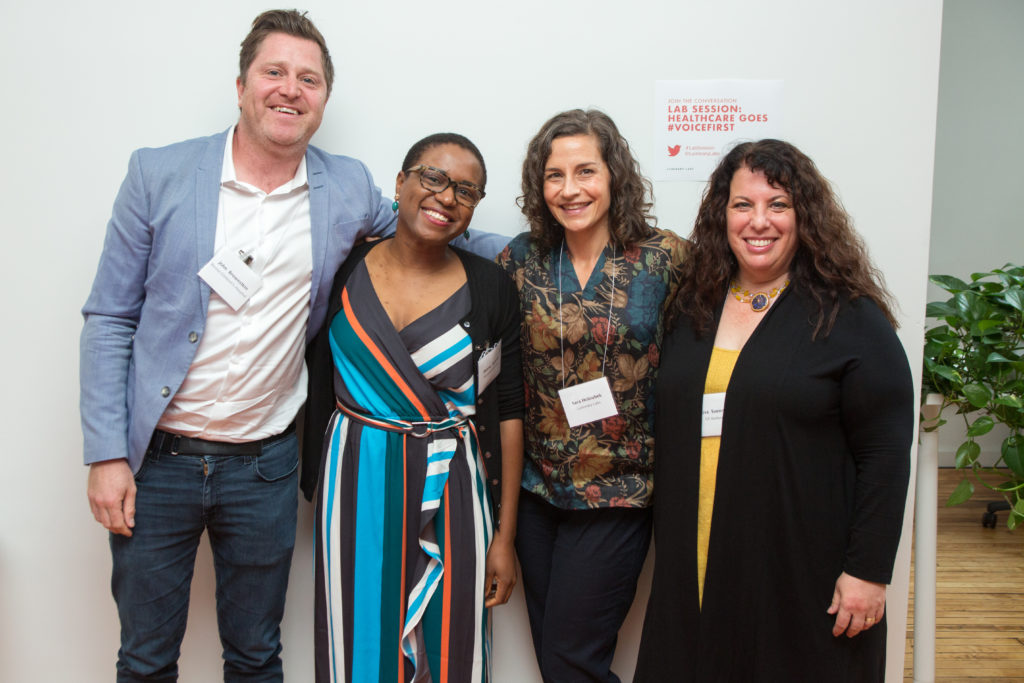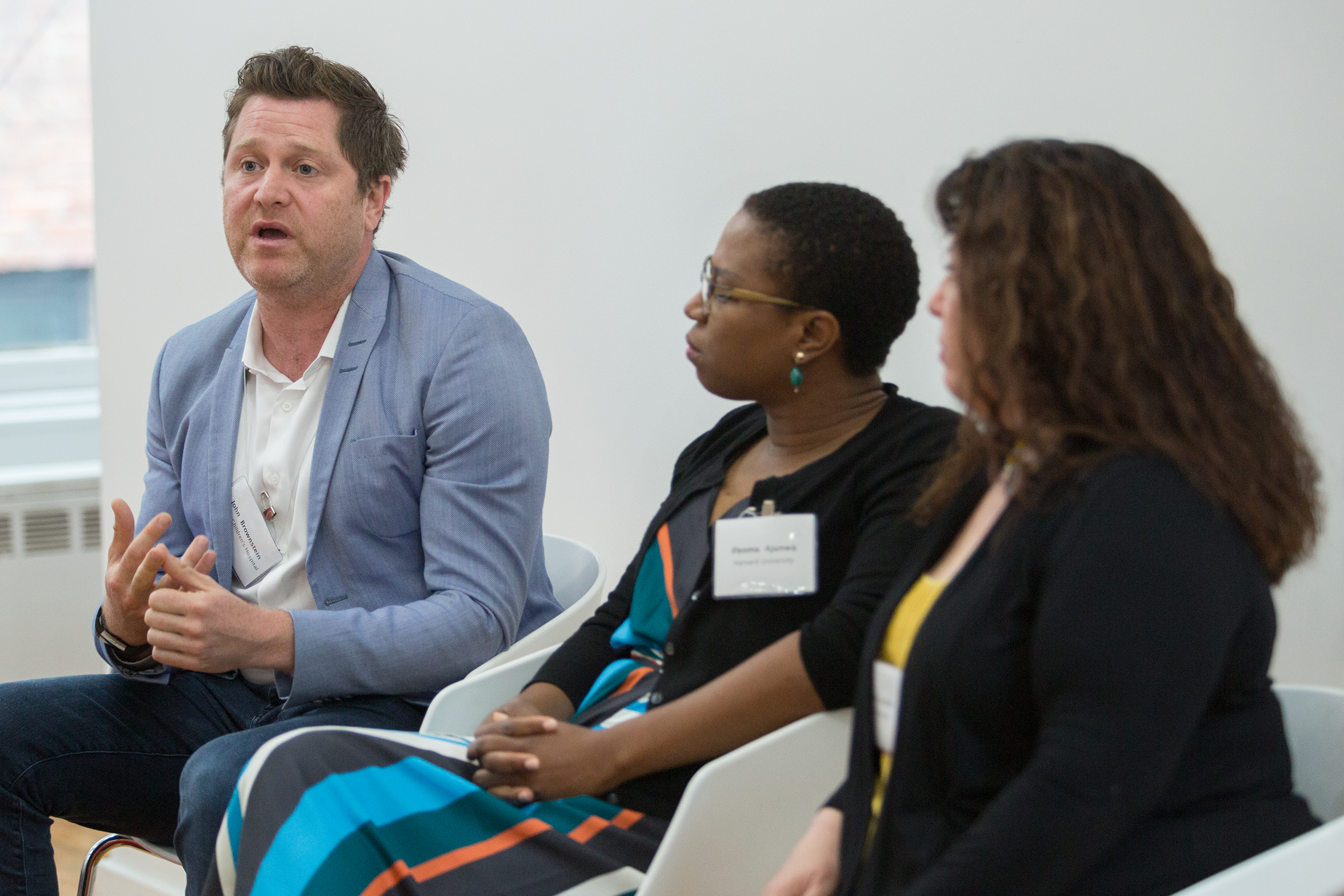A note from the editor — October 10, 2019:
Earlier this year, nine in 10 business leaders surveyed by Adobe said they were investing in voice-enabled experiences. If you’re planning to prototype or pilot a voice application, you’re not alone. That’s why we’ve compiled recent data on the current state of voice tech and updated our most-viewed articles: “The voice tech explainer” and “Voice technology isn’t just a trend; it’s a paradigm shift.”
For our latest thinking on emerging technology and its potential to solve the problems that matter, subscribe to the Lab Report.
Originally published October 27, 2017
Though we’re bullish on voice-first technology, we know that smart innovation strategies consider challenges and potential pitfalls. That’s why we invited three experts — a venture capitalist, a professor, and a hospital’s chief innovation officer — to share their insights at last month’s Lab Session. Luminary Labs CEO Sara Holoubek led a panel discussion on where voice tech is today and the operational, legal, and investment implications of tomorrow.

Left to right: John Brownstein, Ifeoma Ajunwa, Sara Holoubek, Lisa Suennen
Meet the experts
Lisa Suennen of GE Ventures is a venture capital investor and healthcare industry advisor who has worked broadly across the fields of healthcare IT, medical technology, healthcare services and especially where these fields converge in digital health.
John Brownstein of Boston Children’s Hospital is Chief Innovation Officer, leading the hospital’s Innovation & Digital Health Accelerator. His 50-person multi-disciplinary team focuses on bringing digital innovation to every stage of the patient journey.
Ifeoma Ajunwa of Harvard University is a nationally recognized expert on health and privacy law, and an assistant professor at Cornell University. Her forthcoming book, “The Quantified Worker,” will examine the role of technology in the workplace and its effects on management practices.
Our top takeaways

John Brownstein
There’s strong potential for voice technology — in general and in healthcare specifically.
Speaking feels more natural than typing and many patients find value in a voice assistant. Hands-free utility and the ability to quickly access information could provide important efficiencies for doctors, pharmaceutical sales, and other enterprise use cases.
“We’re piloting Alexa right now in the ICU — we’re not connecting it to necessarily patient data, but we’re adding in all the protocols, our bed space guidelines, our scheduling with physicians … We’ve seen direct efficiencies have been gained, and in fact, have directly affected patients’ lives.”
“We have binders and binders full of protocols that physicians have to find on a daily basis. There’s no reason why all that can’t be digitized and then through machine learning and then adding in voice, we can make accessing that information much more efficient.” — John Brownstein

Ifeoma Ajunwa
There are great concerns over privacy, security, and ethics.
Voice technology is uncharted territory. We are breathlessly excited about AI, but we need to think very carefully about how the machines are trained. If diverse groups provide input, we can improve access and prevent disparity.
“I truly believe that we should approach new tech and the acceleration of automation in the workplace with both excitement and caution.”
“We need techno-ethicists who understand the gaps in the law, as well as the ethical challenges that organizations will face in their embrace of new technologies, including voice. And I believe that those ethicists should not be merely seen as an add-on to a corporation’s efforts to attain corporate social responsibility, rather, those voices and diverse perspectives should be in the C-Suite where important decisions affecting millions of people will be made.” — Ifeoma Ajunwa

Lisa Suennen
Despite promising concepts and successful pilots, the reality is that widespread use of voice tech in healthcare is far off.
Platforms are not yet HIPAA compliant and lack of EMR unification will present a challenge for syncing useful patient data to clinical records. In addition, accuracy is still a hurdle. While 96% accuracy may be acceptable for certain industries such as retail and entertainment, in healthcare accuracy is vital.
“There is no doubt that voice will play a huge role a user interface in healthcare for both consumers and clinicians and perhaps even operations professionals. But when it comes to clinical applications, we will need far more perfection in person-to-machine translation – we cannot rely on “good enough” when it comes to patient care.” — Lisa Suennen
We haven’t seen truly transformative examples of voice in health — yet — but companies can’t afford to wait too long to figure out a voice strategy.
Internal and enterprise pilots are lower risk and could provide high value. Consider partnering with or investing in young companies that are tackling these issues and can absorb the risks that a larger company can’t afford to take.
The Lab Report helps executives make sense of emerging trends and new opportunities. Sign up for the newsletter, and we’ll send insights straight to your inbox.



